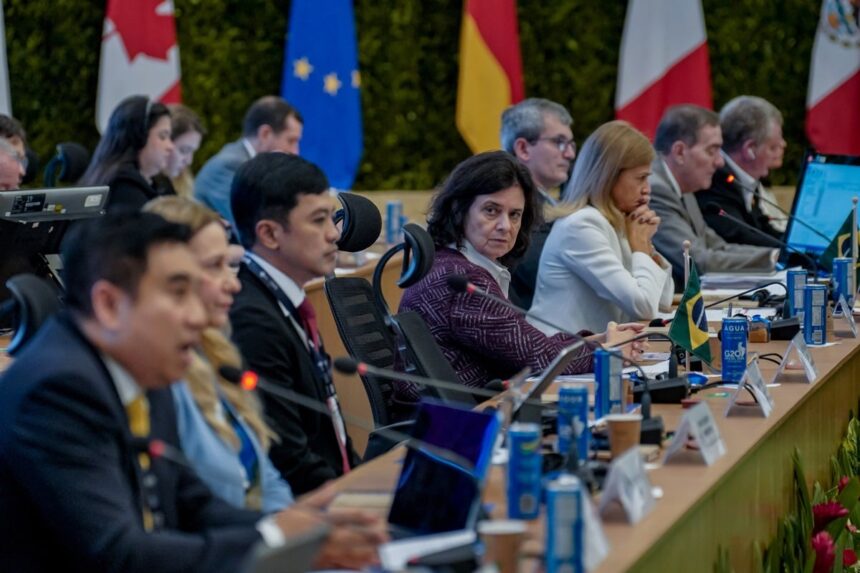“`html
The Quadripartite alliance on One Health, which includes the Food and Agriculture Organization of the United Nations (FAO), the UN Environment Programme (UNEP), the World Health Organization (WHO), and the World Organisation for Animal Health (WOAH), co-hosted a significant G20 High-Level Meeting on One Health on October 30, 2024. This gathering featured a panel discussion titled “Fostering an Enabling Environment for One Health Implementation,” which underscored the urgent necessity for strong governance and multisectoral collaboration to promote the One Health framework, illustrated by practical examples from various nations.
The One Health strategy is vital for achieving optimal health outcomes through an integrated approach that encompasses human, animal, plant, and environmental health. Building upon advocacy efforts during Indonesia’s G20 presidency in 2022 and India’s in 2023, Brazil’s leadership in 2024 emphasizes sustaining momentum in implementing One Health initiatives while urging G20 nations to enhance their commitments.
This panel discussion aimed to stimulate dialogue and create supportive conditions for advancing One Health at global, regional, and national levels. It highlighted essential elements such as effective governance structures, multisectoral coordination mechanisms, legal frameworks, political willpower, and sustainable funding necessary to address global health challenges. Ministerial representatives from G20 countries shared valuable insights from their experiences to facilitate knowledge exchange aimed at identifying collaborative strategies that can amplify impact. The engagement of high-level leaders reinforced G20 nations’ dedication to advancing One Health implementation while laying a foundation for future partnerships.
“In Brazil, we have initiated the Interinstitutional Technical Committee for One Health with a goal of developing a national plan focused on this critical area. This initiative is among our top priorities at the G20 summit. We must equip our countries to face challenges posed by climate change along with its implications for human health. We are navigating through multiple overlapping crises—climate change impacts alongside health emergencies—and this discourse cannot be delayed any longer; it requires immediate action,” stated Dr Nísia Trindade, Brazil’s Minister of Health.
“The declaration made by G20 health ministers signifies an important advancement towards globally integrating a One Health perspective,” remarked Thanawat Tiensin from FAO. “FAO contributes expertise across aquatic and terrestrial animal health sectors as well as food safety practices within agrifood systems crucially linked to global food security.” He emphasized that this commitment highlights an urgent need for unified strategies addressing complex interrelated health issues we currently face today.
“To truly strengthen our approach towards One Health,” Ligia Noronha from UNEP asserted during her remarks,“we must extend beyond traditional public and veterinary healthcare sectors by incorporating environmental sciences alongside social disciplines into our discussions.” She urged all members of the G20 community to ensure equal representation across all voices involved while prioritizing preventive measures that could save lives as well as resources—ultimately enhancing both planetary wellbeing along with economic prosperity.”
Dr Michael Ryan from WHO elaborated further: “Our role extends beyond merely responding visibly during crises; we are dedicated toward prevention efforts alongside building resilient healthcare systems capable of enduring future challenges.” He added that WHO’s new General Programme reflects its commitment toward embracing a comprehensive view rooted firmly within safeguarding global public welfare while promoting equitable access across communities worldwide.
“The commitment demonstrated by G20 leaders towards advancing this holistic approach marks pivotal progress in protecting international public welfare,” noted Dr Emmanuelle Soubeyran representing WOAH.“By fostering coordinated actions spanning diverse sectors effectively enables us not only better prepare but also respond adeptly against emerging threats impacting overall societal wellness.” She expressed pride being partaking within such collaborative endeavors aimed at fortifying resilient healthcare infrastructures globally.
As discussions continue surrounding prioritization around implementing effective strategies underlined throughout these meetings reflect ongoing collaborative efforts undertaken jointly between Quadripartite partners alongside respective member states participating actively within upcoming summits ahead including those focusing specifically upon Climate Change implications intertwined closely related areas concerning equity matters tied directly back into broader objectives outlined previously established frameworks like One Heath Joint Plan Of Action(2022-2026). Furthermore highlighting contributions made via One Heath High-Level Expert Panel(OHHLEP), providing scientific guidance supporting evidence-based policymaking processes moving forward together collectively strengthening governance structures ensuring robust technical assistance available whenever needed enhancing resilience capabilities ultimately improving overall population outcomes achieved collectively over time!
Source
“`





